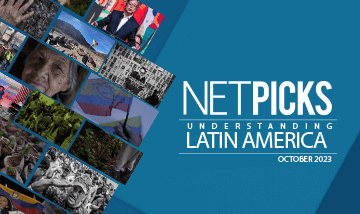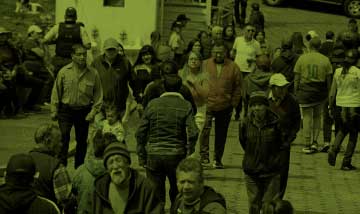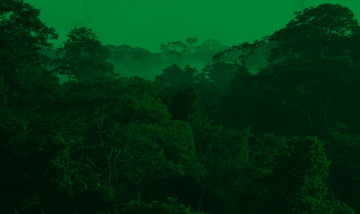Understanding Latin America
Dear readers and colleagues, this month we bring you six articles that reflect the reality of Latin America: one each from Bolivia, Paraguay, Colombia, and Peru, and two from Ecuador on the presidential elections.
- Mixed results for the MAS in Bolivia regional elections
- Protesters in Paraguay question pandemic response and one-party rule
- Over half of global environmental defender murders in 2020 in Colombia: report
- Gahela Cari: “in Peru, people are questioning the system”
- Ecuadorian elections: two analyses
.
MIXED RESULTS FOR THE MAS IN BOLIVIA REGIONAL ELECTIONS
After the tumultuous events of 2019-20, the results of the Bolivian presidential elections appear to have provided the country with a certain amount of stability. The regional and municipal elections of March 07 did not however lead to a major resurgence of the governing MAS, which won only 3 departmental governorships (compared to 6 in 2019), suffering heavy defeats in mayoralty races in the important centers of Santa Cruz de la Sierra and El Alto. Former president Jeanine Añez could, however, only finish third in her attempt to capture the governorship of her native department of Beni. Newly elected President Luis Arce is doing somewhat better, maintaining his popularity at 54%, having moved quickly confront the Covid epidemic and to stimulate a seriously affected economy by investing in extractive projects, which received a boost from the discovery of a major new gas field. Arce has also appointed a younger more ‘technically oriented’ cabinet which on the other hand suffers from a lack of female representation: only three of seventeen cabinet members are women. The new president has, perhaps surprisingly, also maintained distance between himself and Evo Morales; a move that is not entirely unwelcome with those MAS supporters seeking a more democratic party and the development of mid-level leaders. And while the right has fractured and the MAS is now the only real national political force, challenges do remain: a military ‘concerned’ after its top brass was removed, and the fall-out from the arrest of ex-president Jeanine Añez.
Linda Farthing, March 12th, 2021
https://nacla.org/bolivia-regional-elections-mas
N.B. This article was written before Añez was detained.
.
PROTESTERS IN PARAGUAY QUESTION PANDEMIC RESPONSE AND ONE-PARTY RULE
After what appeared to be a positive start, the Paraguayan government’s response to the Covid-19 pandemic has been poor: cases and deaths were still rising in March, and of the $US 500 million in emergency funds allocated to the Ministry of Health, only US$67 million have been spent on medicine and health supplies. This at a time when according to the World Health Organization the country has some of the lowest spending on health per capita in Latin America. The sixty five percent of the country’s population that works in the informal economy also suffered greatly during the months of lockdown, and while support programs were set up to help vulnerable families, payments were low and infrequent. The consequent demonstrations against the President and Vice President intensified after a motion to impeach was rejected in the National Congress, and were violently repressed by the police. But it’s not all about Covid-19. Under laying the protests is a dissatisfaction with the ruling Colorado Party, which apart from 2008 to 2013 has ruled the country for the last seventy years, including the 35-year dictatorship of Alfredo Stroessner; actual president Abdo Benítez is the son of Stroessner’s private secretary. But for many Benítez is not the real power holder in the country, that title going to former President Horacio Cartes, one of the country’s richest people, and whose control over the Colorado party in the Congress is seen as one of the major obstacles to progress. The ongoing protests, now joined by powerful campesino organizations, have therefore been seen by many as a positive step towards and a more equal and democratic country.
William Costa, March 22nd, 2021
https://nacla.org/news/2021/03/22/protests-paraguay-pandemic-colorados
.
OVER HALF OF GLOBAL ENVIRONMENTAL DEFENDER MURDERS IN 2020 IN COLOMBIA: REPORT
A recent report from Front Line Defenders, a Dublin based Human Rights Organization, showed that in 2020 at least 331 environmental defenders were killed around the world, the majority being people who worked in the defense of land and the rights of the environment and Indigenous peoples. Of those, Colombia was responsible for the most murders at 177, over 50%. Many of those killed supported communities in their fight against COVID-19, worked on food security issues and access to medical care, and were critical of governments. But this is not the end of the story, says the report, given that numbers may increase as verifications of allegations are made, and future figures from Somos Defensores de Colombia may confirm an even greater number of deaths. Particularly at risk are people who participate in the implementation of the Peace Agreement with the Revolutionary Armed Forces of Colombia (FARC), form part of the initiatives to replace drug crops, and oppose natural resource extraction projects.
María Fernanda Lizcano, March 2nd, 2021
https://news.mongabay.com/2021/03/over-half-of-global-environmental-defender-murders-in-2020-in-colombia-report/
.
GAHELA CARI: “IN PERU, PEOPLE ARE QUESTIONING THE SYSTEM”
After a popular uprising and two interim presidents, Peruvians will elect a new President and a new parliament on April 11th. According to the latest polls, the left wing candidate Verónika Mendoza is in third place in the presidential race, and has strong possibility of making it to the second round. Has the time for Peru’s Left finally arrived? On the issue we recommend an interview with Gahela Cari, a candidate of the movement Juntos por el Perú led by Mendoza. One year ago, Gahela Cari made history by becoming the first trans woman to run for public office in Peru. But despite receiving strong support with 24,562 votes, she did not win a seat, as Juntos por el Perú did not pass the 5 percent threshold required by the electoral board at the national level. Now, in 2021, the situation is different. The recent protests demonstrated major popular rejection of the neoliberal and conservative politics that have dominated the country for decades. Gahela speaks to this and other questions in a conversation with Eloy Marchán for Jacobin América Latina.
Eloy Marchán, February 24th, 2021
https://nacla.org/news/2021/02/22/gahela-cari-peru
.
ECUADORIAN ELECTIONS: TWO ANALYSES
Although it is now clear that the banker Guillermo Lasso will confront the Rafael Correa sponsored candidate Andres Arauz in the second round of presidential voting on April the 11th, the lead up to that vote has left many questions unanswered. One the one hand, the eventual refusal of the National Electoral Council to re-open the ballot boxes has done little to dispel the idea that the indigenous candidate, Yaku Perez, who disputed second place with Lasso in the first round, could have been the victim of fraud. On the other, Perez’ surprising performance has opened up debate over what constitutes the ‘left’, and whether ‘progressivism’ can sit comfortably with environmentalism, anti extractivism, and womens’ and indigenous rights. If he is elected, the answer will have to come from Arauz, and given his strong ties to Correa, a positive response is no certainty. The divisions within the Indigenous movement and the debate over its future direction, have also come to the fore in the aftermath of the Perez candidacy, and will likely provoke much discussion in future months. So while the April 11th elections will decide who is to be the next president of the country, many other aspects of this singular campaign and their influence on the future are still unclear. Here we present two analyses which may help to clarify the situation surrounding the upcoming vote, its context and its possible consequences for the left.
CASE IN POINT: YAKU PÉREZ. REFLECTIONS ON PROGRESSIVISMS AND THE LEFT
Alejandro Mantilla Q., March 7th, 2021
https://rosalux.org.ec/en/case-in-point-yaku-perez-reflections-on-progressivisms-and-the-left/
The Spanish version of this article was originally published in La Siniestra
PATHS AND FORKS IN THE ROAD FOR THE ECUADORIAN INDIGENOUS MOVEMENT
Pablo Ospina Peralta, February, 2021
https://rosalux.org.ec/en/paths-and-forks-in-the-road-for-the-ecuadorian-indigenous-movement/
The Spanish version of this article was originally published in NUSO





